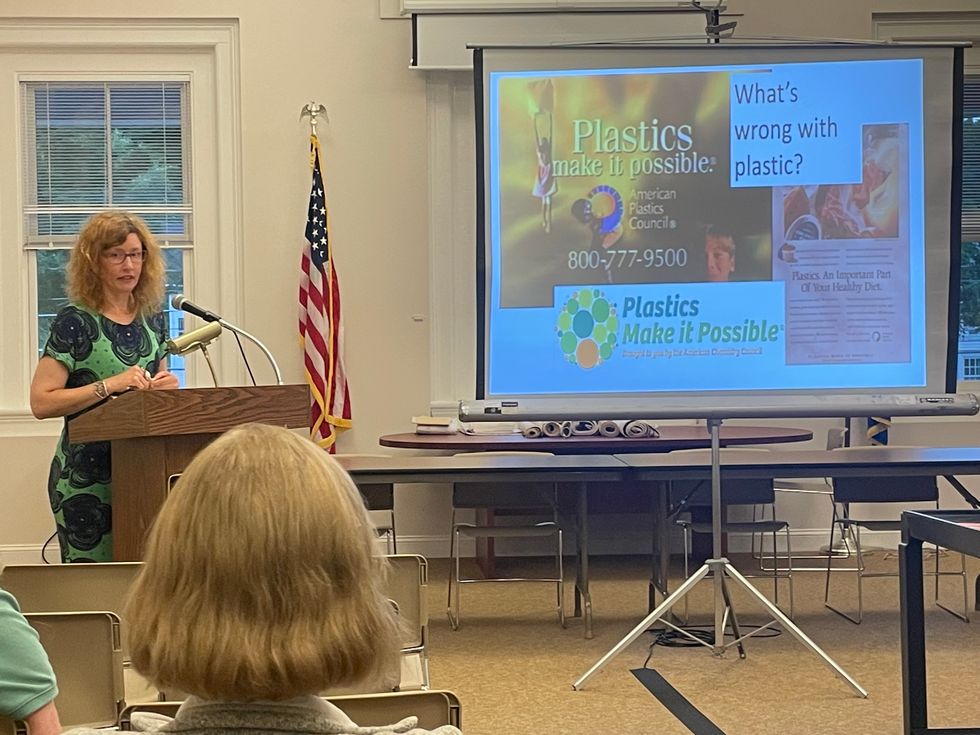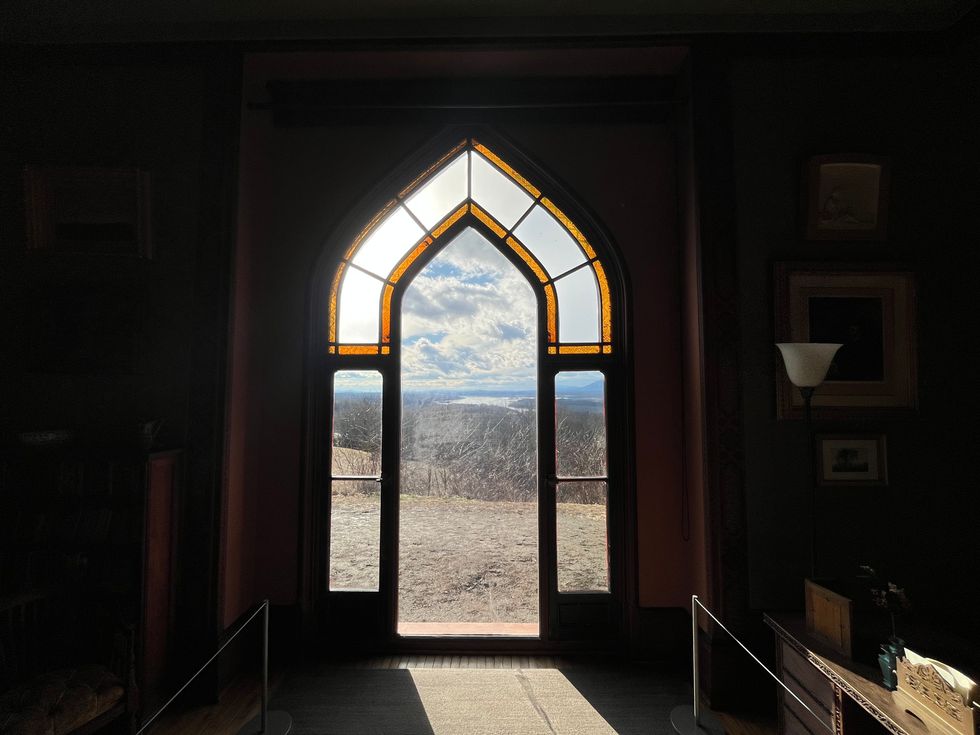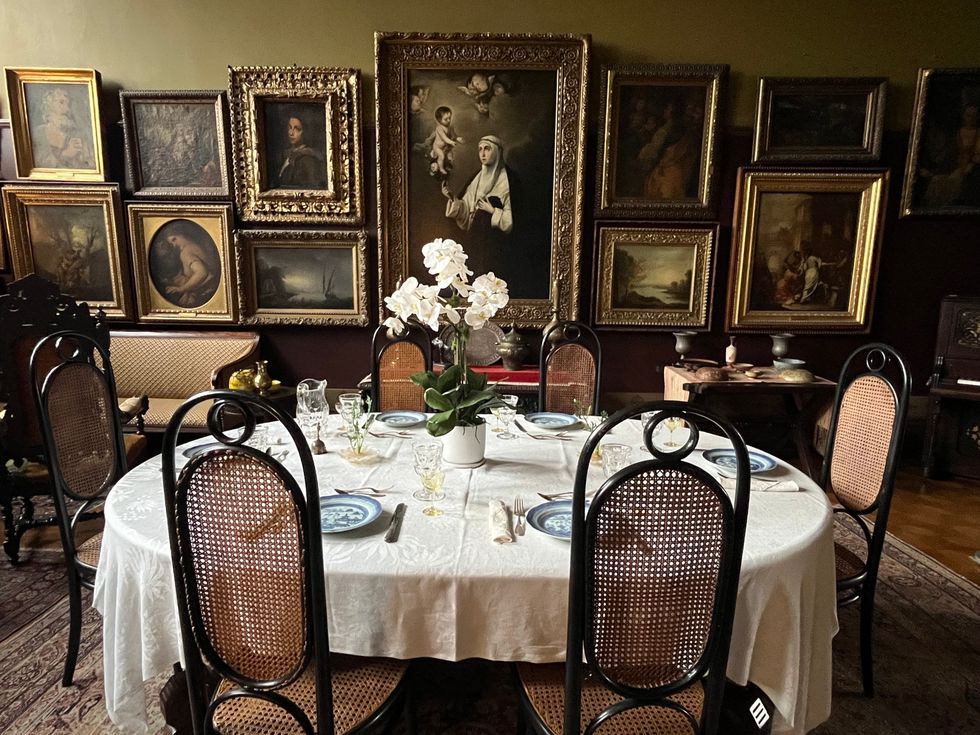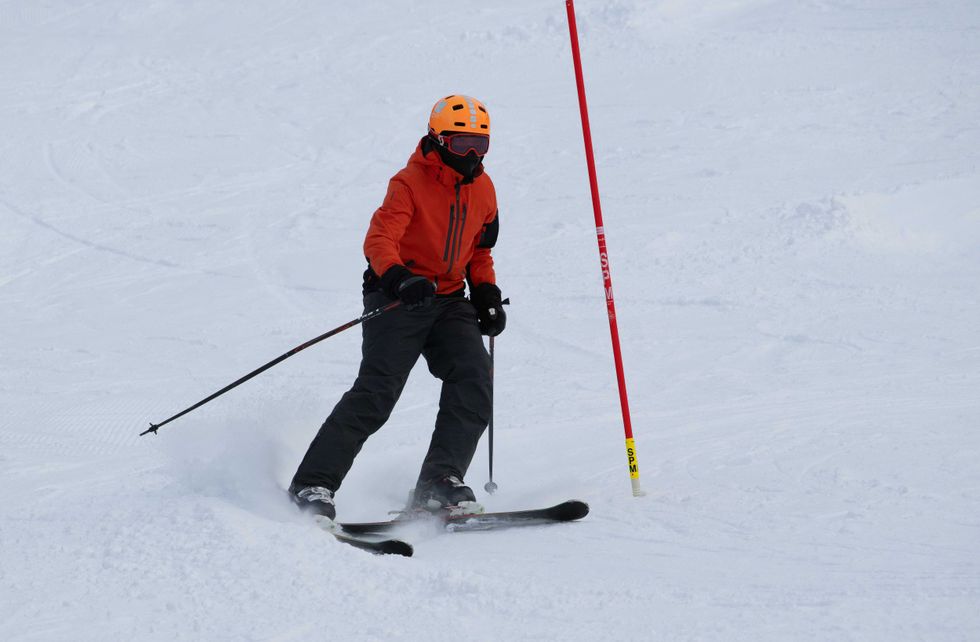Eve Schaub discusses country’s plastics use

Eve Schaub, author of “Year of No Garbage,” highlights and rebuts some plastics industry marketing in a talk at Sharon Town Hall on Thursday, Aug. 3.
Photo by Deborah Maier

SHARON — “I thought we were different” was one audience member’s wistful comment at Sharon Town Hall on Thursday evening, Aug. 3, where approximately 18 attendees of varying ages, all but three female, heard author Eve Schaub present some updates and a personable angle to her recent book, “Year of No Garbage.” Schaub had assured the questioner that single-stream recycling everywhere is a success nowhere.
The event, a precursor to Friday’s book-signing event at the Hotchkiss Library by dozens of authors, began with an introduction by library director Gretchen Hachmeister. Hachmeister is a cousin to Schaub, but the two didn’t know each other until some online genealogical research was done recently.
The self-labeled “stunt memoirist” embarked on the first of a trio of books using her family as experimental subjects. “Year of No Sugar” was followed by “Year of No Clutter” and this latest and, she vowed, last such project.
For each one, she researched deeply and became an expert. In this case, teasing out the complexities of the 60% of garbage that is actually plastic, mostly of the single-use kind, “The learning curve was so steep I was getting nosebleed.”
Research led her to the sobering conclusion, among many others, that producers of packaging “don’t know what it is made of, and don’t care.”
The increasingly popular “use your own container” concept, for example, is generally successful only with small, local stores. This discussion involved the paradox of having to spend more money, time and carbon footprint to shop at small stores. For items too small or otherwise not allowed in municipal recycling, freecycle.org and the Front Porch Forum are good possibilities for giving away clean and dry craftable plastic caps, corks and so on.
‘If you don’t know what it is, it’s plastic’
In the realm of extreme recycling, or going beyond the limits of what one’s municipality accepts in its recycling stream, one problem is the large number of different types of plastics that make up various kinds of packaging, like chips bags that are sandwiches of three different kinds. Programs like plastic film recycling boxes in supermarkets, mail-in and pay-to-play programs like those of the Carton Council and Terracycle are not effective once examined critically.
Eighty-five percent of people say they are recycling plastic, Schaub pointed out, while the actual rate of plastics recycling is now down to a dismal 5%, and that is almost exclusively for items numbered 1 and 2 inside the “chasing arrows” symbol.
Environmental
racism and injustice
To another audience member’s question of where it all goes, Schaub listed Vietnam as a current recipient of our main export. Most people are aware that it was formerly China, until that nation enacted the National Sword ban on foreign shipments that were often too contaminated to be recycled. The worst aspect of this, she noted, is that countries where our waste ends up do not have the infrastructure to deal with it, and it becomes part of their landscape on which children work, play or tread to school, the burning fumes of which everyone must breathe.
“Watch ‘The Story of Plastic,’” Schaub urged, if you want to know the extent of environmental racism around the world and in the U.S., where St. James Parish in Louisiana, already known as Cancer Alley, is slated to see a huge new buildout by Formosa Plastics. And as to what we are all exposed to, she described a photo on which a pile of microplastics, placed on a Lincoln penny for scale, looks like a Marie Antoinette hairdo.
Also cited were the Danish water bottle study, in which a regular plastic bottle filled with tap water was found to contain 400 different plastics compounds after 24 hours, and that Western men’s sperm counts have dropped 50% in the last 50 years.
What can be done?
First, go tell someone, Schaub urged: “Awareness is the starting point for all meaningful change.” Importantly, realize that the glut of plastics is driven by supply, not by demand, as industry figures would have it. Forty percent of yearly production goes to single-use plastics. Also, you can demand that EPR, or Extended Producer Responsibility laws, (sometimes known as Polluter Pays laws) are enacted in your state.
A judge recently dismissed one lawsuit tied to the proposed redevelopment, but a separate court appeal of the project’s approval is still pending.
LAKEVILLE — A Connecticut Superior Court judge has dismissed a lawsuit filed against Salisbury’s Planning and Zoning Commission challenging a zoning amendment tied to the controversial expansion of the Wake Robin Inn.
The case focused on a 2024 zoning regulation adopted by the P&Z that allows hotel development in the Rural Residential 1 zone, where the historic Wake Robin Inn is located. That amendment provided the legal basis for the commission’s approval of the project in October 2025; had the lawsuit succeeded, the redevelopment would have been halted.
The decision, issued Jan. 29 by the Superior Court in Torrington, rejected a claim brought by Wells Hill Road residents Angela and William Cruger seeking to nullify the amendment. The Crugers filed the lawsuit in March 2025, arguing the regulation was improperly adopted and amounted to illegal spot zoning intended to benefit the project’s developer, Aradev LLC.
The zoning amendment drew scrutiny when it was adopted, with opponents asserting it was crafted specifically to enable the Wake Robin Inn project. Town officials and land use staff, however, repeatedly said the change was years in the making and intended to address zoning nonconformities affecting historic inns throughout Salisbury.
In a memorandum of decision, the court found the plaintiffs failed to meet their burden of proof that proper notification was lacking. The judge wrote that “a close examination of the record” showed the Crugers did not demonstrate that public notice of the zoning change was procedurally deficient, unduly vague or untimely filed.
The dismissed case is the first of two legal challenges filed by the Crugers related to the Wake Robin Inn redevelopment. A second lawsuit — an appeal of the P&Z’s approval of Aradev’s application to redevelop and expand the inn — remains pending before the court.
Former Planning and Zoning Commission Chair Michael Klemens said that Thursday's ruling brought vindication. In a Jan. 30 email to the P&Z and commission attorney Charles Andres, Klemens said the lawsuit was largely based on claims that he and Land Use Director Conroy had misled the public and the commission during the regulatory process.
“So not only are the regulations recognized by the Superior Court as legally adopted,” Klemens wrote, “but the aspersions cast upon the integrity of staff and your immediate past chair are hopefully finally put to rest.”
Andres informed the Land Use Office and current P&Z Chair Cathy Shyer that the Crugers have 20 days to challenge the court’s ruling.
Olana State Historic Site, the hilltop home created by 19th-century Hudson River School painter Frederic Edwin Church, rises above the Hudson River on a clear winter afternoon.
On a recent mid-January afternoon, with the clouds parted and the snow momentarily cleared, I pointed my car northwest toward Hudson with a simple goal: to get out of the house and see something beautiful.
My destination was the Olana State Historic Site, the hilltop home of 19th-century landscape painter Frederic Edwin Church. What I found there was not just a welcome winter outing, but a reminder that beauty — expansive, restorative beauty — does not hibernate.
2026 marks the 200th anniversary of Church’s birth, making this a particularly timely moment to take in what he created during his lifetime. Church — one of the most notable artists of the Hudson River School movement — was an accomplished landscape painter who gained a reputation as an artist-traveler.
From South America and Western Europe to the Middle East and the Caribbean, Church sought out dramatic, epic scenes that he could capture on canvas and bring back to the U.S. to sell. The profits from those works, in turn, allowed him to create a breathtaking masterwork of his own: Olana.
Olana rises above the Hudson River like a mirage, its Persian-inspired facade an unexpected sight amid the barren winter landscape. With miles of trails, visitors can take in the natural splendor of rolling hills and the river from every angle. From the house itself, the view stretches across the Catskills, a layered panorama of soft blues and silvers that appears all the more dazzling in winter.

Inside the home, the sense of awe deepens. Olana’s interior is rich with color, pattern and texture — warm reds, stenciled walls, intricate woodwork — a striking counterpoint to the monochrome world outside. Light pours through tall windows, framing the Hudson Valley like living paintings.
Every corner of the house pays tribute to the far-flung places Church visited throughout his career. From architectural details to the objects he collected and displayed, visitors are transported to another world. Walking from room to room feels less like touring a house museum and more like stepping into the mind of an artist transfixed by the staggering beauty of the world around him.
As I made my way back down the hill, the winter light fading fast, I felt refreshed in a way that only comes from seeing something anew. Olana is not just a monument to one artist, but a testament to a way of viewing the world — one that values observation, patience and reverence for the natural environment. For those looking to venture out during the colder months and to be reminded why this region has inspired generations of artists and dreamers, there may be no better place to start than Olana.
Olana State Historic Site is located at 5720 State Route 9G, Hudson, New York. For more information and to purchase tours, visit: olana.org

Berkshire Hills Ski League includes Washington Montessori School, Indian Mountain School, Rumsey Hall and Marvelwood School.
CORNWALL — Mohawk Mountain hosted a meet of the Berkshire Hills Ski League Wednesday, Jan. 28.
Housatonic Valley Regional High School earned its first team victory of the season. Individually for the Mountaineers, Meadow Moerschell placed 2nd, Winter Cheney placed 3rd, Elden Grace placed 6th and Ian Thomen placed 12th.
The league includes a mix of private and public schools. HVRHS competed against Washington Montessori School, Indian Mountain School, Rumsey Hall and Marvelwood School.

Conditions were ideal for slalom skiing at Mohawk, albeit cold for spectators with the temperature in the teens. Approximately 20-inches of snow fell earlier in the week.
Mohawk will continue to host weekly meets of the BHSL each Wednesday through the end of the season. The league championship will take place Feb. 25.

State Sen. Stephen Harding
NEW MILFORD — State Sen. and Minority Leader Stephen Harding announced Jan. 20 the launch of his re-election campaign for the state’s 30th Senate District.
Harding was first elected to the State Senate in November 2022. He previously served in the House beginning in 2015. He is an attorney from New Milford.
In his campaign announcement, he said, “There is still important work to do to make Connecticut more affordable, government more accountable, and create economic opportunity. I’m running for reelection to continue standing up for our communities, listening to residents, and delivering real results.”
As of late January, no publicly listed challenger has filed to run against him.
The 30th District includes Bethlehem, Brookfield, Cornwall, Falls Village, Goshen, Kent, Litchfield, Morris, New Fairfield, New Milford, North Canaan, Salisbury, Sharon, Sherman, Warren, Washington, Winchester and part of Torrington.